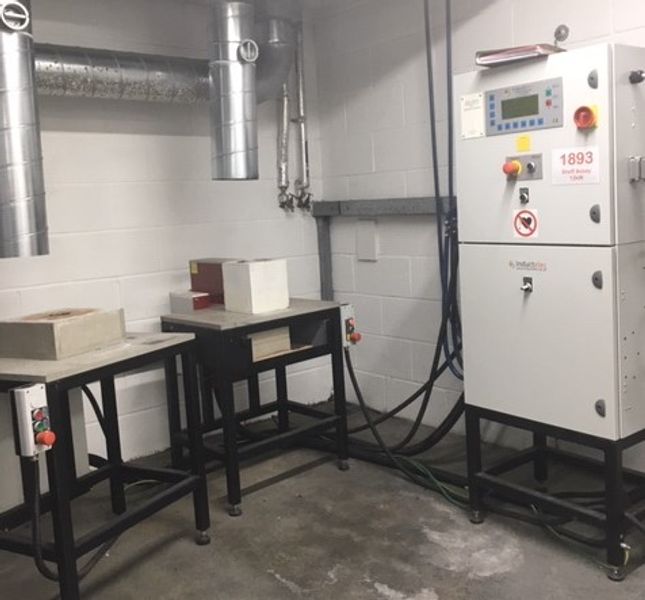Custom-built induction furnace substantially enhances melting capabilities
Published: 13th May 2019

The Analytical Services division of the Sheffield Assay Office (AS) has expanded its capacity for melting by acquiring a custom-built induction furnace. In the last few months, AS has seen a continued increase in demand for melting precious and non-precious metal alloys and our new equipment now enables us to deliver a very high melt quality in half the time.
Principle of Induction Furnaces
Although the term “furnace” evokes images of roaring flames, an induction furnace doesn’t use any fire or combustible fuel. Rather, it uses the principles of electromagnetic induction to create vast amounts of heat. The furnace itself is essentially a box built around two head-coils of high conductivity copper tubing that is magnetically shielded. Melts are placed within a crucible and a high-frequency alternating current (AC electricity) is passed through an electromagnet. The metal’s resistance to the electric current generates heat – the level of which can be increased or decreased by changing the flow of electricity.
Melting Process
Analytical Services melts and assays between 25-50kg of scrap metal per week. The chemistry of the melts varies significantly from pure platinum, gold or silver, to dental and jewellery scraps or ferrous and steel sub-products. The melting and assay of precious metal is one of the key areas of work for AS; with approximately 50% of this precious scrap processed being dental and mixed metal materials. The melt process of these scraps is challenging due to differences in melting points and densities of the different metals contained in these materials.
Melting precious metals requires achieving the melting temperatures of all elements present to produce a homogenous liquid phase, which will solidify after being left to cool in a mould. Precious metals have different melting temperatures; these are 1,064ºC, 962ºC, 1,555ºC and 1,768ºC for gold, silver, palladium and platinum respectively. Therefore, if there is a mixture of precious metals containing platinum, the furnace must be able to reach at least 1,768ºC.
Furthermore, the use of fluxes and/or additives is a well-known practice during melting metals in order to facilitate separation of unwanted, non-metallic components, and therefore improve the homogeneity of the final melt. Fluxes encourage the formation of a slag, which contains the original flux (e.g. borax Na2B4O7) and any non-metallic material, which releases precious metals to the molten metal phase. Slag rises to the surface and may be skimmed off while metallic phases remain on the bottom of the crucible.
In addition, metallic copper or its oxides are used as a collector of precious metals from material containing ceramics and/or porcelains.
Conclusions
The use of an appropriate furnace, fluxes and additives and the knowledge of an experienced melter play an important role in producing a homogenous final bar. Although using the most optimal melting procedures, there are some instances when is not possible to produce a fully homogenous bar due to separation of metals during the solidification (cooling process). In these instances, the bar assay must show the bar heterogeneity clearly, which will be taken into account during the trading agreement.
For more information about our melt and assay services, or for any other information, please call us on 0114 231 2121 or email info@assayoffice.co.uk.
The Sheffield Assay Office was established in 1773, under an Act of Parliament and today the company assays and hallmarks the precious metals - silver, gold, platinum and palladium. Sheffield Assay Office is one of only four UK assay offices who all work to uphold the Hallmarking Act of 1973 and continue to ensure consumer protection for customers purchasing precious metals.
To find out more about the whole range of services offered by Sheffield Assay Office, such as our hallmarking and analytical services, please email us at info@assayoffice.co.uk or complete the contact form on our website at http://www.assayoffice.co.uk/contact-us ,
Sign up here to all the latest news from Sheffield Assay Office direct to your inbox